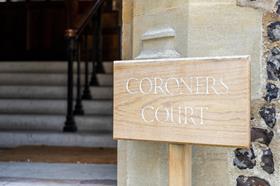An assistant coroner has been issued with a formal warning for misconduct after he was overheard describing a barrister’s submission as ‘bollocks’.

A complaint was made to the Judicial Conduct Investigations Office about assistant coroner Heath Westerman on behalf of a party to an inquest.
It was alleged that following a hearing, the complainant - the deceased’s mother - had overheard Westerman describe her barrister’s submission as ‘bollocks’ and that the duration of the inquest listing was ‘ridiculous’. Westerman was also alleged to have said ‘who do these people think they are’.
Westerman accepted he had used the term ‘bollocks’ due to frustration caused by a ‘poor submission’ by the complainant’s barrister.
He said the discussion with two members of staff ‘took place in a private area at a time when he believed the complainant had left the building’. Westerman accepted his language was ‘inappropriate and intemperate for which he was very sorry’.
The JCIO said Westerman denied he had made the other two comments. He had been under ‘considerable pressure of work at the time’ and had apologised to the complainant straightaway, reported himself to the senior coroner and recused himself from the case.
An investigation found that as well as using ‘bollocks’, Westerman also said something implying the duration of the listing was ridiculous.
The JCIO said: ‘These comments were both inappropriate and prejudicial.’ The investigation found the coroner, who had a previously unblemished conduct record, had not said ‘who do they think they are?’.
A JCIO spokesperson said: ‘The Guide to Judicial Conduct reminds judicial office holders to ensure that their conduct, both in and out of court, maintains and enhances the confidence of the public, the legal profession and litigants, in their personal impartiality and that of the judiciary. They are also expected to treat people with courtesy and respect.
‘The lord chancellor and the lady chief justice agreed with the nominated judge that a formal warning was a reasonable and proportionate sanction in this case.’


























